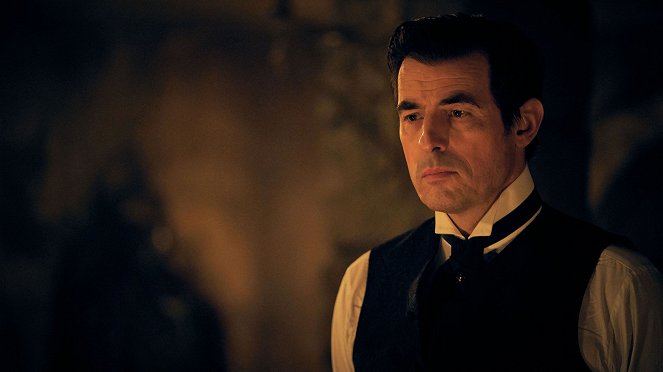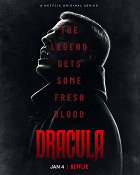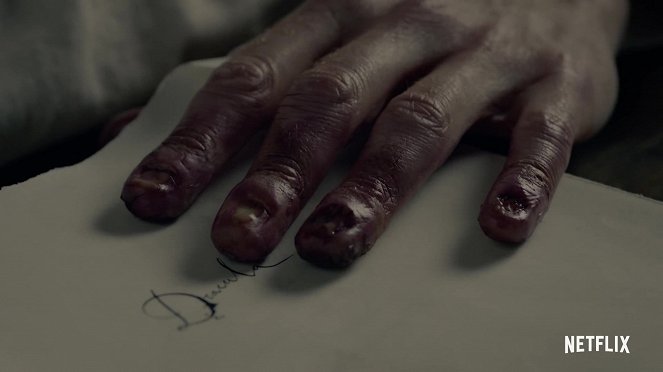Kamera:
Tony Slater LingBesetzung:
Claes Bang, Jonathan Aris, Morfydd Clark, Sacha Dhawan, Mark Gatiss, John Heffernan, Youssef Kerkour, Clive Russell, Joanna Scanlan, Dolly Wells (mehr)Streaming (1)
Folgen(3)
-
Die Regeln des Biests (E01)
-
Blutzoll (E02)
-
Der dunkle Kompass (E03)
Inhalte(1)
Neue Geschichten stellen die Legende des Grafen Dracula und seine blutigen Verbrechen in einem anderen Licht dar und beleuchten die Verletzlichkeit des Vampirs. (Netflix)
Videos (2)
Kritiken (3)
Wenn ich jetzt Leslie Nielsen in Mel Brooks' Dracula - Tot aber glücklich nicht einbeziehe, gab es wahrscheinlich nie eine witzigere Version von dem Grafen. Nein, im Ernst, seine neue Version hat mir unglaublich Spaß gemacht. Ich habe zwischen den einzelnen Episoden absichtlich nicht die Rezensionen gelesen, weil mir klar war, dass hier viel geschimpft wird. Ich hatte Recht. Vielen kommt die Galle hoch, wenn sie sehen, was die Drehbuchautoren mit Stokers Vorlage gemacht haben. Aber Hand aufs Herz – wollten wir wirklich, dass sie zum hundertsten Mal nacherzählt wird? Ich bestimmt nicht. Schon nach dem Trailer tat es mir leid, dass die Autoren von Sherlock Dracula nicht in der gegenwärtigen Welt leben ließen. Es reichte aber die erste Folge und es war mir auf einmal völlig egal. Nach dem klassischen Anfang setzt die Handlung auf anderen (wenn auch vertrauten) Wegen fort. Es ist mehr oder weniger ein klassischer Horrorfilm mit einer Überraschung nach der anderen. Der zweite Teil ist wie ein Krimi von Agatha Christie. Und wenn man am Ende darüber nachdenkt, was um Gottes willen im letzten Teil passieren wird, kommt eine nächste Überraschung. Es ist mutig, originell und unterhaltsam; das Werk ist sich die ganze Zeit seines Weges sicher… Einfach ausgezeichnet.
()
Much more modest than I expected, especially considering that the first half takes place in two locations and the second half, for the most part, actually just in a single one. Only in the finale does it ignite exactly the passion that I would have expected from this creative duo. I admire Steven Moffat and Mark Gatiss in all their writing, and Dracula reminds me most of their famous work, Sherlock. This classic work is frequently quoted, often paraphrased, frequently turned upside down, and often takes bold shots from the side, occasionally hitting exactly those places that the viewers will love, and occasionally completely missing the mark. I always admired their boldness, and with Sherlock, all the aspects came together perfectly. But here their gradually changing and increasingly loose style developed over the course of thirteen episodes filmed over seven years. Dracula attempts the same transformation in just three episodes broadcast over three days. Therefore, it cannot impress with long-term development, and I understand why the ending rubs some people the wrong way. On the contrary, The Dark Compass struck the right chord with me, perhaps with its wild madness, or with the feeling that once again, the screenwriters' dreams are coming true, or maybe because the central power struggle between the protagonist and eternal enemy ended differently than readers wanted. Sometimes, such an atmosphere borders on mindless fan service, but I don't mind. Why should I? It hit me with full force. Under different circumstances, I tend to be quite conservative when it comes to adhering to source material, classics, tradition, and the canon, but this version of the Count grows closer to my heart the more it deviates from the classic perspective (which, it must be said, we've already seen a hundred times).
()
The Dracula television series is very divisive. It has its moments, with the first episode definitely being the best. The great confrontations between Sister Agatha and Dracula are the show's highlight. However, the attempt to be too original, too different, and too modern ultimately leads to the legend being drowned in this adaptation, and it ends up as a weird patchwork that does not really know what it is.
()
Galerie (9)
Photo © BBC



Werbung